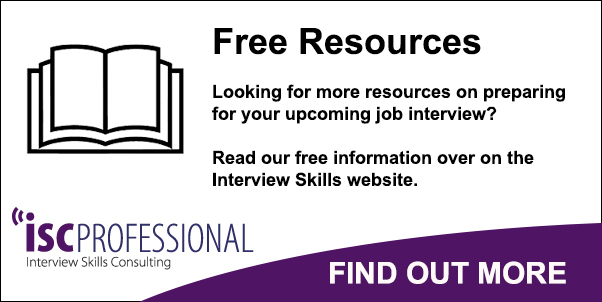Improve Your Interview Skills in 10 Steps
Job interviews can seem daunting, but there are lots of things you can do to improve your interview skills and overall performance.
Getting help from a professional coach is one option more and more jobseekers are exploring, particularly in today’s competitive employment market.
In the meantime here are some top tips to get your interview strategy started, and improve your interview skills:

1. Research…everything
Carry out an in-depth analysis of all aspects of the job, the company, the industry and the people who run the organisation. This will be helpful in informing what to bring up in the interview, and how to handle certain situations; all important when improving your interview skills.
Some people never get past the company website and so fail to pick up on broader issues facing the particular sector they want to work in.
2. Anticipate questions and prepare structured answers
Develop a list of potential interview questions and work out in advance how to effectively answer them. Common openers include questions such as, ‘Tell me more about yourself,’ giving you an opportunity to highlight your skills, qualifications and experience and connect these with the role being interviewed for.
More specific questions such as, ‘What do you think are the main challenges facing our company within the next five years?’ allow you to demonstrate that you know your way around the sector and have an understanding of their position within in.
3. Remember the first impression
Remember that creating a strong first impression is important, so work on your opening lines and how you will introduce yourself, and any relevant experience.
Dress appropriately for the role with smart business attire the safest approach. Enter the room confidently, making good eye contact with the interview panel and responding to the greeting they offer- usually a handshake. Remember- the first ten seconds are critical.
4. Pay attention to body language
93% of communication comes down to our non-verbal behaviour and within that 55% is about body language, so it is essential to get it right. Posture should be positive with the body angled towards the interviewers.
Avoid distractions such as face touching or tapping fingers. Maintain eye contact throughout and if possible mirror the positive body language of the interviewers.
5. Control those nerves
Deep breathing before entering the room can help slow down potential speed talking- a common symptom of interview nerves. If you find you are shaking try clenching your thigh muscles- this may sound strange but it really works.
6. Listen carefully
Tune into what you are being asked and if necessary take a moment before responding. This helps focus on what you really want to say and shows you have the confidence to control what is going on.
7. Remain focused
The interview may seem like a lengthy exchange, but it is, in fact, an incredibly short opportunity to sell your skills to an employer. Keep focused on that objective and do not let your attention drift. Never yawn, fidget or worse still check your phone.
8. Be friendly..but not too friendly
Your interview skills can often rely on how social you can be. Develop a rapport with the interview panel by smiling and using humour where appropriate. Keep delivery natural- imagine you are talking to a group of friends. Avoid being over-familiar – always remain professional.
9. Ask relevant questions
Focus on questions which show you can think strategically, for example, asking how the job will evolve over the short and medium term. Enquiring about opportunities for training and development also show you are committed to ongoing upskilling.
10. Follow up
Getting in touch after the interview positions you as an enthusiastic candidate and will remind the panel what you can offer. A carefully drafted email thanking the panel for the opportunity and reinforcing the link between your skills and experience and the job requirements is a must.
To get more free information on interview preparation as well as expert professional advice, contact the team at Interview Skills Consulting.

